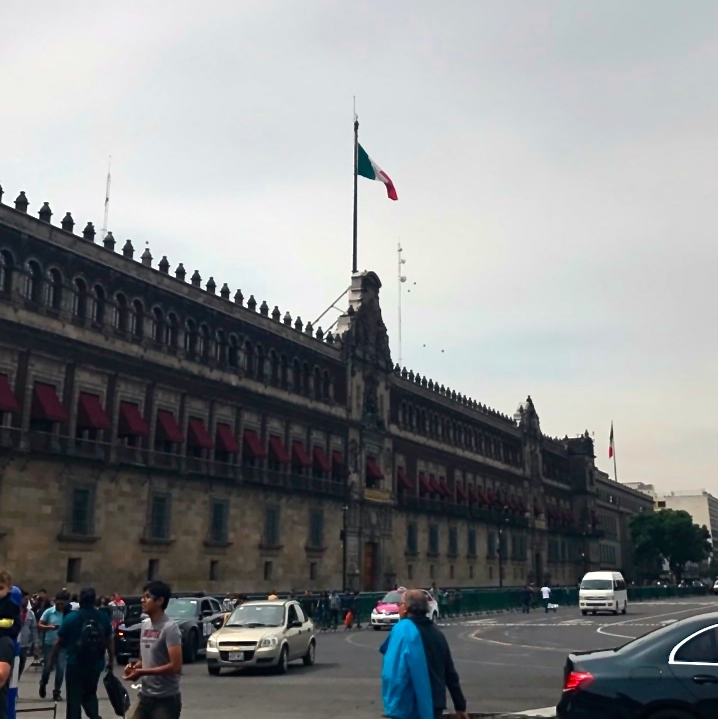The Death of Free Press in Mexico

Image of the Palacio Nacional, Mexico City by Patty Viramontes
On June 26, 2017, the dead body of reporter Salvador Adame was identified in the state of Michoacán, making him the seventh journalist to lose their life this year in Mexico. On account of this recent murder, Mexico has become the deadliest place for journalists in the world.
While only four of the seven deaths are confirmed to be related to the journalists’ work, all of the cases highlight an unrelenting attempt at silencing writers who have either revealed corruption or who were on the verge of discovering corrupt ties. The journalists targeted either reported on politicians, drug cartels, or, often, the deadly bridge uniting both.
The murders of these journalists underline an unethical alliance between organized crime and the political elite in Mexico, as both branches are often complicit in – and responsible for – the killing of reporters. In the most recent death, Adame was kidnapped and murdered by a group of armed gunmen. The kidnapping was allegedly ordered by the leader of a drug cartel in Michoacan, causing prosecutors to cite “personal problems” as the reasoning behind Adame’s death.
By blaming the murder on personal issues, prosecutors ignore the role the journalist’s investigative work played in their murder, blurring any potential connection between the murder and the journalist’s reports. While officials have not declared the murder of Adame to be directly linked with his work as a journalist, Adame’s critique of political figures in an area where cartels garner heavy influence suggest Adame’s journalism as a motive for his death.
The inability to properly investigate the deaths of journalists perpetuates a cycle of murder and fear for those at risk. Those who abduct and kill journalists feel they can do so without consequence, cultivating an advantageous climate for criminals and politicians who benefit from the suppression of negative press.
In March of this year, the murder of Mirolava Breach Velducea echoed the corrupt alliance between politicians and cartels. In 2016, Breach reported on connections between mayoral candidates and local drug cartels throughout the state of Chihuahua; threats against Breach quickly flooded in as she revealed secret alliances. At her murder site, a note was left that stated Breach was killed “for being a loud-mouth.”
The murder of journalists has contributed to growing anxiety throughout the nation as many reporters have begun to censor their own work. While fear seeps through communities of journalists, “politicians allow [attacks against journalists] to occur because they end up benefiting from the fear and terror that make journalists not publish their work.” The link between both parties becomes only more severe when an examination into the role of politicians and police reveals policy makers often encourage the murder of journalists, while police are bribed by cartels. Understanding this link, it becomes clear protection for journalists is inadequate – the protectors are often complicit in the crimes.
The role of the government in the persecution of journalists has inched closer to the spotlight with the recent revelation arguing the government has instrumentalized spyware against journalists. Since 2011, the Mexican government has purchased spyware meant to target terrorists and other criminals. According to many journalists and anti-corruption activists, the government has used the spyware against journalists and other activists to hack their phones and gain access to personal data that may be used against them. This hacking is manifested first through a text carrying a link that, when clicked on, infects the phone with a virus. Despite claims the government is responsible, the government declares its innocence, arguing it only targets criminals. There is no concrete way to prove the government is to blame, as there is no force monitoring the government’s use of the spyware. Instead, those who are unrightfully targeted by the spyware are left vulnerable to continued attacks.
With the government, politicians, and cartels against journalists, a solution to protecting reporting is difficult to achieve. The threat of death and increased government vigilance have triggered fear and self-censorship, discouraging journalists from speaking out against corruption. The recent murder of a journalist is a disturbing reminder of the risks faced by those who dare to report misconduct. As trepidation accompanies journalists in Mexico, an important pillar of democracy further disintegrates. Those complicit in the destruction of journalism are consequently steering Mexico further away from a democratic state with every inadequate attempt at protection, every cyber attack, and every death.




